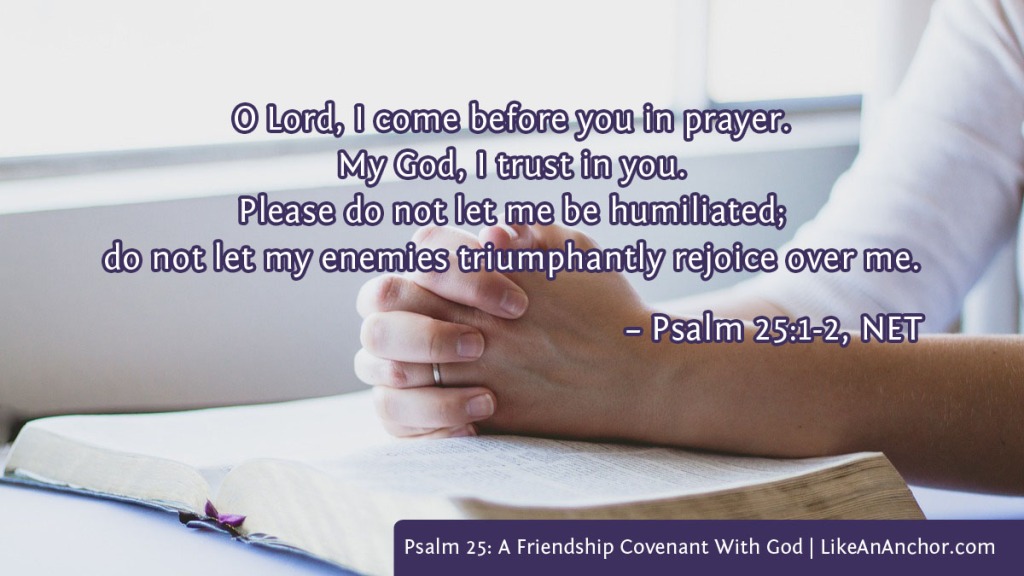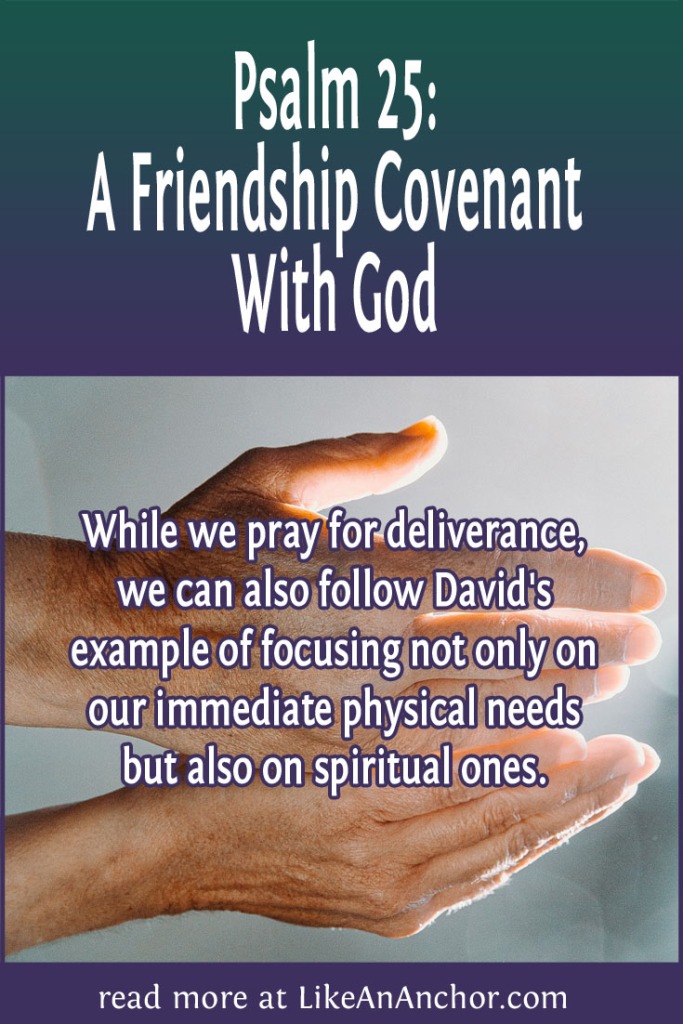I love reading through Psalms, as I’m sure many of you do. They’re among the most beloved passages of scripture. You probably have several at least partly memorized. Many are set to music, and people of God have been singing them for thousands of years. As familiar as they are, there’s still more to learn from them. As we read the Psalms, we might notice something we hadn’t thought of before or the Lord might grant us a deeper understanding of truths we’ve read over and over.
Today, I want to look at one of David’s psalms. We don’t know when he wrote Psalm 25, but there is a note that tells us he was the author. From the psalm itself, we can assume that David was facing some sort of trouble when he wrote it because he asks God for help. It’s not one of the more desperate sounding psalms, though; David seems to have peace in this trouble and confidence that God will hear His prayer and respond.
To you, Yahweh, I lift up my soul.
Psalm 25:1-3, WEB
My God, I have trusted in you.
Don’t let me be shamed.
Don’t let my enemies triumph over me.
Yes, no one who waits for you will be shamed.
They will be shamed who deal treacherously without cause.
In these opening lines, we see David coming to Yahweh (God’s proper name, see Ex. 3:14-15) in prayer. In a respectful, conversational poem, David states his trust, makes a request, and says that he knows Yahweh responds to these types of prayers from His people. David was confident that God can be counted upon to keep His promises, and he also knew that God wants us to ask Him for things. Prayer keeps lines of communication open and builds relationship, even though God already knows exactly what we need.

Forgiveness and Faithfulness
I find it interesting that even though David opens the prayer with a specific request (“Don’t let me be shamed. Don’t let my enemies triumph over me”), he immediately shifts from asking for deliverance to asking for instruction. He wants God to teach him because he’s confident in the God of his salvation.
Show me your ways, Yahweh.
Psalm 25:4-5, WEB
Teach me your paths.
Guide me in your truth, and teach me,
For you are the God of my salvation,
I wait for you all day long.
David doesn’t spend the whole prayer asking for God to rescue him from a physical situation. The bulk of the psalm is spent on discussing relationship. There’s teaching, and covenant-keeping, and claiming the Lord as “my God.” David also discusses his sin, likely because that damages relationship with God. Jesus hadn’t died for our sins yet when this psalm was written, but David knew about the promised Messiah (Acts 2:22-31) and he knew that God is merciful and gracious to forgive. Then, as now, God deeply desires a relationship with His people and He is eager to forgive sins and mend broken relationships if only we’ll turn to Him.
Yahweh, remember your tender mercies and your loving kindness,
Psalm 25:6-11, WEB
for they are from old times.
Don’t remember the sins of my youth, nor my transgressions.
Remember me according to your loving kindness,
for your goodness’ sake, Yahweh.
Good and upright is Yahweh,
therefore he will instruct sinners in the way.
He will guide the humble in justice.
He will teach the humble his way.
All the paths of Yahweh are loving kindness and truth
to such as keep his covenant and his testimonies.
For your name’s sake, Yahweh,
pardon my iniquity, for it is great.
If you read my new Armor of God study guide or a blog post that mentioned battle prayers of Biblical kings, you might remember that these types of prayers acknowledge God’s power to help, make a request for help, and claim the Lord as their God (2 Chr. 14:9-12; 20:5-12; Is. 37:14-20). The praying person may also remind God of His previous faithfulness, asking that He will continue to guard the people He made a covenant with. We see those elements in David’s battle prayer as well, alongside his request for instruction and restored relationship.
Covenant Kindness
Earlier in the psalm, when David prays, “Yahweh, remember your tender mercies and your loving kindness,” the phrase “loving kindnesses” is translated from the Hebrew word chêsêd (H2617). It’s challenging to translate this into English. Often translators choose words like “kindness” or “mercy,” but those miss the word’s deep connection with covenants. There is scholarly argument over whether chesed is faithfulness to covenant obligations, or mercy/kindness as a character trait of God that underlies His covenants, but either way this word is inextricably linked in scripture to the formal relationships God makes with people (Theological Wordbook of the Old Testament entry 698).
What man is he who fears Yahweh?
Psalm 25:12-14, WEB
He shall instruct him in the way that he shall choose.
His soul will dwell at ease.
His offspring will inherit the land.
The friendship of Yahweh is with those who fear him.
He will show them his covenant.
In this psalm, David delights in God’s goodness and faithfulness to the covenant, and also asks for God’s gracious forgiveness so David could be counted as one who keeps covenant with God. Even the most faithful human beings–David himself being called a man after God’s own heart–miss the mark. We sin, which damages relationship and breaks covenant agreements with God. That’s one reason He planned on a New Covenant through Jesus Christ; He knew the Old Covenant wasn’t enough on its own to fix humanity’s rebellion and establish eternal relationships (Heb. 8:6-12). It is His grace that makes it possible for us to keep covenant with Him, and Jesus’s sacrifice that makes it possible for us to be considered righteous.
Verse 14–the one about friendship and covenants–is the one that made me want to look at this psalm more closely. When we receive grace, we have a responsibility to live faithfully with God as His loyal friends. In this psalm, David connects friendship with God to hearing Him and heeding His instructions. Friends of God like Abraham, David, and Jesus’s disciples share a special relationship with God (Isa. 41:8; James 2:23; John 15:14). There’s something precious about loving God in this way, and sharing a covenant relationship with Him.
Emotional Plea for Aid

As David wraps up this psalm, he returns to his plea to God for deliverance from enemies. He’s still confidently looking to God, but he admits to being “desolate and afflicted” with a troubled heart. I like these sorts of psalms, because they reassure me that God wants us to express our honest emotions in our prayers.
My eyes are ever on Yahweh,
Psalm 25:15-22, WEB
for he will pluck my feet out of the net.
Turn to me, and have mercy on me,
for I am desolate and afflicted.
The troubles of my heart are enlarged.
Oh bring me out of my distresses.
Consider my affliction and my travail.
Forgive all my sins.
Consider my enemies, for they are many.
They hate me with cruel hatred.
Oh keep my soul, and deliver me.
Let me not be disappointed, for I take refuge in you.
Let integrity and uprightness preserve me,
for I wait for you.
God, redeem Israel
out of all his troubles.
As I write this blog post, there’s war in Israel following recent terrorist attacks. Around the world, “More than 360m Christians suffer high levels of persecution and discrimination for their faith” and 5,621 were killed for their faith last year (Open Doors World Watch List 2023). Even those of us not facing physical persecution fight spiritual battles that take many forms. We can think of many reasons we might want to pray this prayer alongside David today.
While we pray for deliverance for ourselves and God’s people, we can also follow David’s example of focusing not only on our immediate physical needs but also our spiritual ones. We can pray for rescue from enemies and from our own sins. We can pray for God’s friendship, express respect for His covenant and His teachings, and praise Him for the deliverance we confidently expect.
Featured image by Pexels from Pixabay
Song Recommendation: “Psalm 25 (Show Me Your Ways)” by The Psalms Project



